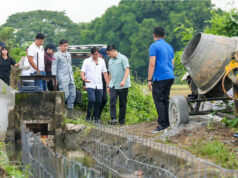SUGAR production up to the second week of May rose 3.8% year on year, the Sugar Regulatory Administration (SRA) said.
SRA said raw sugar output was 2.045 million metric tons (MMT) after the second week, up from 1.970 MMT a year earlier.
This is equivalent to 40.916 million 50-kilo bags.
The crop year for sugar starts in September and runs to August.
Meanwhile, demand for raw sugar declined 15% to 1.470 MMT.
Total sugarcane milled fell 4.54% year on year to 21.489 MMT.
Refined sugar output fell 4.6% year on year to 749,731.45 MT.
The millgate price fell 12.71% to P1,489.86 per 50-kilo bag. The retail price was estimated at P45 to P53 per kilo.
The food sector and industry lobby has been calling for the deregulation of the sugar industry to reduce the commodity’s domestic price. They include the Philippine Food Exporters, Inc. (Philfoodex), Philippine Chamber of Commerce and Industry (PCCI), and the Philippine Exports Confederation, Inc. (PHILEXPORT), who have expressed support for a measure replicating the opening up of the import market, as seen in the rice industry.
The Confederation of Sugar Producers (CONFED) said that there is no need for deregulation, and denied claims that the cost of domestic sugar is “prohibitive.” They also said freely importing sugar will affect the livelihoods of 5 million people.
“It seems that the lobby to liberalize sugar importation is being resurrected again through the food processors and manufacturers who comprise a miniscule market in terms of sugar usage,” Raymond V. Montinola, spokesperson for CONFED, said in a statement Wednesday.
He also said that the sugar industry in Thailand is heavily subsidized compared to the country’s sugar industry, which explains why Thai sugarcane sell for about P31 to P34 per kilo at retail, compared with P60 to P65 for domestic sugar.
“Even the Sugar Industry Development Act (SIDA) fund which was supposed to help in the modernization of the industry has been reduced to P500 million, a fourth of what was initially P2 billion. Thus farmers are reduced to traditional farming, (and must absorb) the high cost of farm inputs and implements,” Mr. Montinola noted.
“The SRA has mentioned in the past that they will import sugar when the need arises. The fact that the same has not been issued means that there is ample sugar in the domestic market for the food processors. All they have to do is ask and consult with the agency that is tasked to address their concerns,” he said. — Vincent Mariel P. Galang



